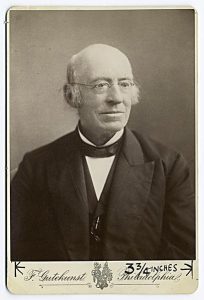
William Lloyd Garrison (December 10, 1805-May 24, 1879) was an abolitionist, social reformer, and activist. Garrison became famous for his newspaper, The Liberator and his founding of the American Anti-Slavery Society.
When Garrison was 25 years old, he joined the anti-slavery movement. He originally was a part of the American Colonization Society, an organization that supported formerly enslaved people to move back to Africa. However, Garrison strongly disagreed with the southern reasoning for the movement: that the reduction of liberated African-American people living in the United States would help preserve the industry of slavery. As such, by 1831, Garrison rejected the society and left for New England.
By 1831, Garrison co-founded the newspaper, The Liberator, with Isaac Knapp. In the first issue, Garrison wrote:
Assenting to the “self-evident truth” maintained in the American Declaration of Independence, “that all men are created equal, and endowed by their Creator with certain inalienable rights—among which are life, liberty and the pursuit of happiness,” I shall strenuously contend for the immediate enfranchisement of our slave population. In Park-street Church, on the Fourth of July, 1829, in an address on slavery, I unreflectingly assented to the popular but pernicious doctrine of gradual abolition. I seize this opportunity to make a full and unequivocal recantation, and thus publicly to ask pardon of my God, of my country, and of my brethren the poor slaves, for having uttered a sentiment so full of timidity, injustice and absurdity. A similar recantation, from my pen, was published in the Genius of Universal Emancipation at Baltimore, in September, 1829. My conscience is now satisfied. I am aware, that many object to the severity of my language; but is there not cause for severity? I will be as harsh as truth, and as uncompromising as justice. On this subject, I do not wish to think, or speak, or write, with moderation. No! no! Tell a man whose house is on fire, to give a moderate alarm; tell him to moderately rescue his wife from the hand of the ravisher; tell the mother to gradually extricate her babe from the fire into which it has fallen;—but urge me not to use moderation in a cause like the present. I am in earnest—I will not equivocate—I will not excuse—I will not retreat a single inch—AND I WILL BE HEARD.
The Thoreau family was first introduced to The Liberator in 1833, when the Ward family joined their household. The Wards were passionate abolitionists, who not only brought their vigor and anti-slavery drive to the house, but also a copy of The Liberator. This exposure made Henry and the rest of the Thoreau family excited about the abolitionist cause, as they would all later become great supporters of the movement. Thoreau would be featured in The Liberator with his long and passionate defense for Wendel Phillips, another American abolitionist. Additionally, Garrison himself wrote a eulogy for Helen Thoreau upon her death, thanking her for all of the fervent work she did for the anti-slavery movement.
By 1861, The Liberator had gained immense support from around the country. It’s letters, articles, and speeches became a cornerstone for American abolitionists. The popularity of the paper continued to grow with subscribers from all around the Northern United States as well as Canada and even England. Eventually, on December 29th, 1865, at the end of the Civil War, Garrison published his last issue of the paper, complete with a “Valedictory column.”
In addition to The Liberator, in January 1832, Garrison started the New England Anti-Slavery Society with Bronson Alcott as one of the founding members. In this society, Garrison called for a non-violent protest against slavery, sparking the phenomenon of not paying taxes that went towards the Mexican War. By 1833, Garrison’s movement grew and members from ten different states banded together to form the American Anti-Slavery Society. By 1840, Garrison’s Anti-Slavery Society had about 2000 chapters and almost 200,000 members. Their anti-slavery petitions, journalism, and protests all utilized the idea of non-violent resistance. It was this idea of peaceful protest that later sparked Thoreau’s refusal to pay his taxes and his famous essay ‘Civil Disobedience.”
Thoreau’s Contributions to The Liberator:
Wendell Phillips Before the Concord Lyceum

